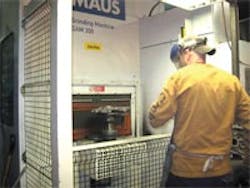Several foundry operations are recording “considerable savings in time and outside expense” from their surface grinding, cutting, and riser removal operations, according to Maus SpA (), thanks to the machine builder’s SAM grinding centers.
The SAM 300 is touted for its speed and power, as well as its compact design. For grinding and riser-cutting of parts weighting 0.5 to 15 kg (up to 33 lbs.), it’s a solid, high-power machine that offers flexibility, loading and unloading in four seconds, with up to four tools, and a small footprint.
Grede Foundries is one of the satisfied customers. It runs gray and ductile iron jobs in very high production quantities, including automotive suspensions, bearing caps, brackets, brake components, compressor parts, crankshafts, exhaust manifolds, and many others.
Grede’s director of manufacturing engineering Gary Dalgaard recalls being “very impressed” with the SAM 300 model displayed at trade shows. “Overall, the machine was clearly superior to those we’d been using in our plants. The laser locator, highproduction flexibility, and off-line programming capability were all definite upsides for us,” said Dalgaard. “Our budget was very tight and Maus made the generous offer to install the machine at our Iron Mountain, MI, plant for several months. If we didn’t like it for any reason, they’d agreed to take it back.” Dalgaard was not surprised by the machine’s performance and Grede authorized the purchase. “It did everything advertised, as they say. It performed even better than the time studies Maus developed were projecting.
“The Maus machine will allow us 100% payback in less than one year,” Dalgaard added. He noted two parts– a 20-lb. valve body and a 240-lb. gray iron casting – on which the Maus machine made substantial improvements in the time-to-part comparison, as well as surface-finish uniformity, and ultimately, the overall cost. Maus even rebuilt one of the sets of tooling that was provided in order to increase rigidity and support.
ThyssenKrupp Waupaca Foundry’s Plant 5 in Tell City, IN, performs heavy grinding on gray iron castings for automotive and agricultural equipment parts, also using a SAM 300. The plant was using a manual grinding process that resulted in high scrap, slow processing times, considerable handling of workpieces, and a lowerquality finish than his plant can now achieve with the single station Maus machine.
“The ease with which we can introduce a new product into our system, and the great consistency we achieve with the Maus machine really makes a difference in our bottom line,” explains plant manager Dale Gengelbach.
Time and motion studies done before and since the machine’s installation have been exceeded in actual production. “The consistent finish of the products we produce is quite obvious,” said Gengelbach. “Our intention in purchasing an automated system was twofold. We wanted to get the grinders out of our employees’ hands and have them focus on quality control to a much greater degree.”
“Also, we were seeking to improve our SPMH numbers. Both these goals have been achieved. We sought out a machine supplier with whom we could partner and Maus has satisfied our expectations in technical sales, application engineering, and service alike.”
